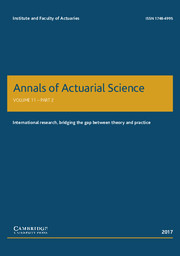Article contents
Empirical Evidence on the Use of Dynamic Solvency Testing and Financial Condition Reporting in the United Kingdom Life Insurance Industry
Published online by Cambridge University Press: 10 May 2011
Abstract
To gain insight into the use of Dynamic Solvency Testing (DST) and Financial Condition Reporting (FCR), a questionnaire was distributed to Appointed Actuaries in United Kingdom life offices. The response rate of the main survey was 76%. An independent-samples t-test for non-respondent bias was conducted and the results suggest that the respondent sample is representative of the survey population. Results from the 62 firms responding revealed: (1) Scenario testing was the most commonly used DST techniques. (2) Most life offices regularly run less than ten scenarios in scenario testing. (3) Most life offices reported using a five-year forecast period in DST. (4) The two most commonly seen difficulties are: difficulties in communicating complex issues to non-specialists, and how to present extremely adverse scenarios without causing undue concern. (5) Nearly all life offices use FCR. (6) Guidance Note 2 is generally considered acceptable. (7) Compared with the results reported by previous studies, the use of DST techniques is now more common in life offices. (8) There is a significant difference in DST/FCR practices between with-profits and non-profit offices.
- Type
- Papers
- Information
- Copyright
- Copyright © Institute and Faculty of Actuaries 2006
References
- 1
- Cited by


